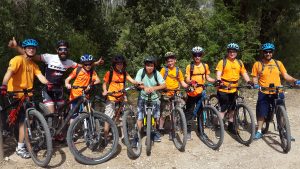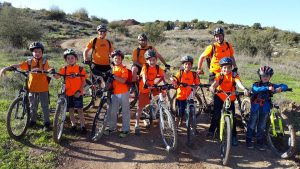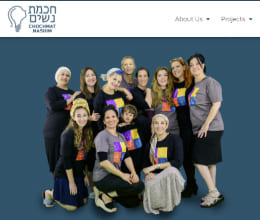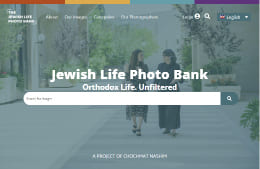Originally printed in In Jerusalem June 9, 2017
Can a bike change a child’s life? Rabbi and educator Nachum Wasosky has seen it happen for hundreds of children and is working to add another thousand to that number.
Raised in a single family home in the US, Wasosky knows he was lucky to have people looking out for him, making sure that he had what other kids had—school trips, a place on sports teams, and emotional support. He attributes his well-being and success to feeling like a normal kid with just as much value as anyone else.
It’s an awareness he’s brought with him throughout his career in informal education for youth and what drives him to help as many as he can.
During his six years of study at Aish HaTorah in Jerusalem, Wasosky realized that what he had missed out on as a child was the positive aspects of being Jewish. As a kid, he wasn’t exposed to those things that would have made him want to identify as a Jew.
He and his wife Shana decided to bring this positive awareness of Judaism to the youth in Denver where the assimilation rate was 70%, the highest in the country at the time. And so, with a Federation grant of $500,000 they opened a Jewish outreach teen center. Shana created the ‘curriculum for formal informal education’ that they would use to reach the teens. 
For six years they ran the program that welcomed all Jews and taught them about their religion in a positive way. The Wasoskys made such an impact on the youth that they are still in touch with many of them over a decade later.
When in 2008, they made aliya to Ramat Bet Shemesh, Rabbi Wasosky began working with Hakshiva – a NGO providing therapeutic family programs, counseling services, tutoring, and a center for kids at risk. Most of the youth were anglo olim from religious homes who were struggling with adjustment and leaving the religious lifestyle. Some were failing in school, others socially.
Wasosky built the youth program for Hakshiva over five years where it grew to include up to 100 teens, eventually including native Israelis as well.
But for Wasosky, something was missing. “It’s easy to get a kid off the street. If you build a fun place and serve free food, the kids will come. But building a relationship, making a change in that child is not done by playing pool or eating pizza. You’re getting a few hours out of them, not a life change,” he says.
It was at this point that Wasosky began mountain biking – a very popular sport in the Beit Shemesh area which is a hub for biking. Like much about Wasosky, his enthusiasm for the sport was infectious and there were soon 100 men who had made mountain biking a regular part of their lives.
“I saw that biking was changing my life on a profound level- spiritually mentally emotionally and physically. I started asking the other guys why they biked. It’s not a cheap or easy sport. It takes time, money, preparation and effort. So I wanted to understand what kept them committed.”
The responses were telling:
‘My wife makes me go. She says I’m a different person, a better husband and father when I ride.’
‘I’m more productive at work.’
‘It helps me face challenges in other areas of my life.’
‘I’m connecting with the country and recharging.’
Everyone’s answer spoke of a way that riding positively affected themselves and their lives.
“That’s when the light switch went on,” says Wasosky. “If grown men, professional men, are experiencing such an impact from biking – how much more could this affect a struggling child or even a well-adjusted kid who is just growing into himself?”
Wasosky decided to try out his theory. He offered to take the kids from the center on a ride. Ten of them took him up on his offer. Friends of his donated bikes, Holy Bagel sponsored bagels and Shana prepared breakfast for the group.
The teens were told they could not party the night before, that they had to prepare their clothing, hydrate and sleep well.
“Suddenly, kids with no boundaries, had boundaries and a reason to get up in the morning. Kids who had no use for discipline were restricting their own behavior. The teens showed up and the ride was a complete success. They exhibited an immediate shift in behavior.
One teen opened up on the ride about the tough challenges he was facing, another, the ‘cool kid’, wound up having to walk his bike up the hill, and then, when he reached the top, took out a pack of cigarettes and ripped them up in front of us saying, “I’m done.”
The ride became a weekly event and when Wasosky called for a break in the August heat, parents began calling. They begged him not to stop the rides saying things such as, “I haven’t seen my son like this in years, he’s disciplined, exited, and motivated. He has a reason to get up in the morning and looks forward to this all week.” They offered to pay him to continue the rides.
 Thus, Geerz began. Just as gears on a bike enable a rider to maneuver through hills and dips on the trail, Geerz gives the rider tools to maneuver through life’s ups and downs. Together, the Wasosky’s created a curriculum that focuses on mental, emotional, spiritual and physical growth with biking as the tool.
Thus, Geerz began. Just as gears on a bike enable a rider to maneuver through hills and dips on the trail, Geerz gives the rider tools to maneuver through life’s ups and downs. Together, the Wasosky’s created a curriculum that focuses on mental, emotional, spiritual and physical growth with biking as the tool.
In June 2015, the ‘Magazine’ profiled this organization. Since then, Geerz has grown to 15 groups (three of which are just girls) in five cities across Israel; Bet Shemesh, Modiin, Chashmonaim, Ra’anana and Gush Etzion.
As small groups have been shown to be best for education, Geerz groups consist of 10 riders with two instructors, each trained by Geerz, one adult and one younger assistant. Half of the assistant instructors are Geerz graduates.
The program runs for 10 months with weekly rides of 90 minutes each. Each week focuses on a different life skill. Half way through ride, the group sits for a break and that week’s lesson is taught. It always includes a story with a message.
“For example,” explains Wasosky, “perseverance is taught when the group tackles their first rough hill. They may not make it the first time, but each week they’ll get farther and farther and one day they will make it all the way to the top. Overcoming fear is another skill they learn. Riding downhill can be scary, and the group works on how to deal with fear and learns the tools to get through it.”
Key chains are given as rewards for achievement in three primary areas – safety/survival (3 levels), riding skills (6 levels), and bike mechanics (3 levels).
Geerz fills a real need for kids who don’t get the tools they need to thrive in life. Schools teach academics, parents try to support, love, and care for children, but neither school nor home focus on giving children the life skills they need to make good decisions, overcome challenges, and believe in themselves- the critical skills for personal growth and success.
Geerz also creates a family, a team for kids who may not have that structure at home or school. They learn social skills and form a community. Suddenly, they have brothers and teammates that they may never have had before.
Four pediatricians send their patients to Geerz for therapeutic reasons. Biking has been proven to help with ADHD, muscle tone, social skills, self esteem and confidence. Numerous studies correlate biking to increased attention, less impulsive behavior, and higher performance in school. Specialized Bikes and RTSG Neuroscience measured the effects of cycling in school-age children who were either diagnosed with or displayed ADHD-like symptoms. Researchers concluded that cycling: enhances processing of information, improves attention and attenuates impulsivity, enables children to better understand their feelings, improves kids’ mood, decreases BMI and waist circumference, and accelerates cognitive performance even after just one ride.
Dr. Ephraim Rosenbaum, pediatrician and medical director of Leumit in Ramat Beit Shemesh has recommended Geerz to patients and family members. He says, “The children I have sent to Geerz have been incredibly successful in improving all their functioning, at home, in school, with friends, in virtually all areas.”
Wasosky makes sure to point out, “Geerz is for everyone, not just for at risk kids. Everyone benefits. It doesn’t matter to us why you’re here. You’re here and that matters. The curriculum is set up so that anyone can gain from it and better their life.
“We have all kinds of kids. For example, biking is great for Charedi kids because that population shies away from team and competitive sports to avoid hero worship of professional players. Geerz is a great answer to this because biking is not the type of sport where one can become obsessed in a ‘nonkosher’ way. We have Charedi groups as well as groups in which charedim are with the general population- by request.”
Wasosky wants to bring Geerz to those who need it most. “The Ethiopian population is in dire need of Geerz, they are still marginalized and struggling. We want to run a two year program to integrate and build them up.”
It costs $20,000 to fully equip a group for a year. This includes bikes, helmets and other gear for each rider. To fund this initiative, Geerz ran a 2 day bike ride to raise funds for kids who need Geerz but can’t afford the bikes or program.
Currently, scholarships exist for those who want to participate but can’t afford it. Bikes are provided for the time they are in the Geerz program.
The goal was to raise $100,000. They exceeded that goal by raising a total of $120,000 with a two day ride from the Mediterranean Sea to the Sea of Galilee. A total of 25 riders took one of two professionally mapped out routes, a 30 kilometers a day track and a 60 kilometer a day track.
The greater community came together to support and provided assistance. Hatzalah escorted the group with EMT’s in an All Terrain Vehicle and Beer Bazaar sponsored a beer explanation and tasting.
The Jewish National Fund of America was a sponsor of the ride. Both Jewish National Fund America and Jewish National Fund Australia have been ongoing supporters, helping to grow Geerz.
Geerz is currently looking for more organizations and corporate sponsors who recognize the value in helping kids develop life skills through riding to enable more kids to ‘ride the trail and discover their path.’
“We can help 500 Ethiopian kids – as well as a large number from the fringe Charedi population where there is high demand and high need.”
Wasosky’s current goal is “a thousand bikes for a thousand kids”. Why?
“Poverty is a vicious cycle,” he says, “the poor stay poor. They stay undereducated, they lack self-worth and self-esteem. At Geerz, we flip the “I can’t” to “I can”, and this is half the battle in breaking the cycle.


